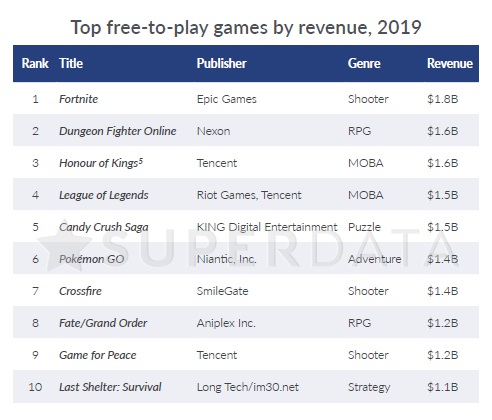Led By Fortnite, Free-To-Play Titles Amassed 80% Of Digital Gaming Revenue In 2019
Free-to-play gaming revenue dominated other sectors in 2019, according to SuperData's Year In Review report, released today. Free-to-play games accounted for 80% of all digital game revenue in the year, mostly coming from mobile titles, but even F2P PC revenue far outstripped its premium and pay-to-play PC counterparts.
On the flip side, free-to-play gaming on consoles amounted to just $1.6 billion in revenue, compared to $13.8 billion for premium games. For 2020, SuperData predicts roughly similar revenue for both mobile and F2P PC games but a sharp downturn for F2P console games, especially in North America and Europe. Obviously, they're not taking the upcoming Phantasy Star Online 2 launch on the Xbox One into account.
As far as individual games went, most of the top sellers were mobile or Eastern titles, though Fortnite (mostly Battle Royale) was still #1, for the second year in a row. League of Legends was #4 on the list; SuperData said that, despite LoL's bigger audience, Fortnite players were twice as likely to spend on in-game content, possibly due to the game's many tie-ins with popular culture brands like Avengers, Stranger Things, Star Wars, and the NFL.
The rest of the report has information on the top-selling premium games of the year, XR (AR/VR/MR) games, gaming video content, and more. You can get it for free from the SuperData site.
Related Articles
About the Author

Jason Winter is a veteran gaming journalist, he brings a wide range of experience to MMOBomb, including two years with Beckett Media where he served as the editor of the leading gaming magazine Massive Online Gamer. He has also written professionally for several gaming websites.
More Stories by Jason WinterRead Next

A new, adorable, MMO is making its home on PC today.
You May Enjoy

The title and the company are closing on March 31st.

The update also adjusts loot tables for guild raid and Riftstone bosses.

Explore the final ancient fortress.

It only took eight years.


Discussion (1)